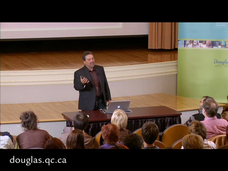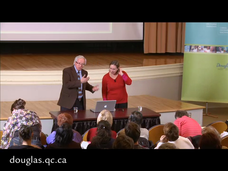Between head and heart
Camillo Zacchia, PhD, psychologist and senior advisor at the Douglas Mental Health Education Office (MHEO) once again acted as host and facilitator. Classes were offered in French this year. For the first time, Mini-Psych School were webcasted live.
Program
The brain - Simultaneously strong and fragile
The brain is a magnificent and superbly complex organ, and many key questions about its function remain unanswered.
Véronique Bohbot, PhD is a neuroscientist.
Heart and mind - Emotions as a survival tool
Anger, sadness, joy, excitement, fear and anxiety are all emotions that are essential to our survival, but they can also cause us a lot of trouble! Camillo Zacchia, PhD is a psychologist.
| Part 1 | Part 2 |
Volatile Emotions - Bipolar and other mood disorders
Mood swings can be rough for those who experience it. Such feelings may lead people to think they have a borderline personality disorder, bipolar disorder or another type of mood disorder. It is important to distinguish between what constitutes “normal” emotional behaviour and mood disorder.Serge Beaulieu, MD, PhD, FRCPC is the Medical Chief of the Mood, Anxiety and Impulsivity Disorders Program and Bipolar Disorder Program. Suzane Renaud, MD, is a psychiatrist.
Hitting bottom - Chronic or episodic depression and burnout ?
Depression can be a symptom of another mental health issue (such as bipolar or eating disorder) or may occur as a result of a physical health problem (such as cancer or heart disease). It can be chronic or episodic.Mimi Israël, MD, FRCPC is the Psychiatrist-in-chief
Genes, Environments and Gender - The Eating Disorder “Mix”
We tend to blame social pressures alone for the increasing incidence of anorexia and bulimia, but more often than not they are simply the trigger that sets off an individual's pre-existing vulnerabilities. It is essential to investigate other stressors that can trigger the onset of an eating disorder such as genetics, physical and psychological environments; gender also plays a key role.Howard Steiger, PhD, is the Chief of the Eating Disorders Program.
Losing brain power - Alzheimer's or just normal aging?
As the human body ages, cognitive abilities and memory inevitably decline. But when this decline occurs at a faster rate than normal; such rapid decline is known as dementia. Alzheimer's disease is a form of dementia characterized by the death of neurons, the cells that play a primary role in brain function.Judes Poirier, PhD, is the Director of the Molecular Neurobiology Unit.
You can buy the 2011 DVD pack at our online store.









